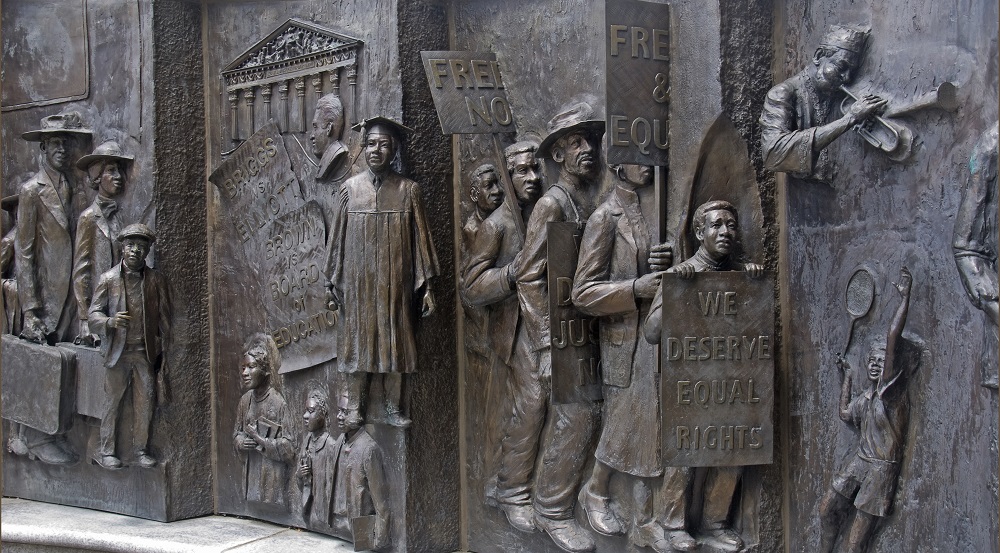Negro History Week, the precursor to Black History Month, was created in 1926 by Carter G. Woodson and the Association for the Study of Negro Life and History. When it was accepted by various states’ Departments of Education and cities’ school administrators, Woodson referred to its conception as “one of the most fortunate steps ever taken by the Association.”
Forty-four years later, the Black United Students of Kent State University celebrated the nation’s first Black History Month, and six years afterwards, in our nation’s bicentennial, the United States government officially recognized the annual observance.
President Gerald Ford commented, “We can seize the opportunity to honor the too-often neglected accomplishments of black Americans in every area of endeavor throughout our history.”
[quote_colored name=”” icon_quote=”no”]… if we praise Black history to where others can see how brightly it shines, then Black History Month will, instead of holding us back, push us forward.[/quote_colored]
On the first day of February, to celebrate the beginning of this observance, I posted to Facebook a Langston Hughes quote that I’m fond of and captioned it “Welcome to Black History Month.” A friend of mine commented on the quote questioning whether or not Black History Month was holding the race back.
Unclear as to what he meant, I talked with him, and he explained his opinions, which I’m sure many other people share. Our conversation was lengthy, but his thoughts can be summarized as follows:
He felt that Black History Month, despite being a great concept, would ultimately turn out to be negative. Black history is vast and significant in a multitude of ways, much more than the typical slave narrative, and he felt that Black History Month was a relegation of this rich history, turning it into a simple footnote tacked onto American and Western history. Finally, he felt that by relegating this entire people’s history to just a month, and by not giving it the constant attention it merits, it would become more difficult for Black history to become canon in our education.
His concerns are all valid, but I disagreed with his pessimistic view of the annual observance.
Instead, I believe Black History Month, if utilized properly, can be really useful. As of now, without the attention put on it during February, Black history, outside of the unavoidable slave narrative, would largely be ignored.
So having a month to highlight it may be exactly what’s needed to give Black history its justly due attention. I believe we do need Black History Month, or at least something like it. I’d be hesitant to say that any other culture is as disconnected from its past as Black people in the United States are now. There’s so much more to Black history than slavery and Martin Luther King Jr., history that most people may never know about. I believe that, were it not for the attention Black History Month draws to all of that history, people would become even further disconnected from it, and its importance could be irreversibly lost.
Furthermore, I believe Black History Month isn’t solely for the purpose of learning or discovering Black history. While that is an important aspect of the observance, I believe its more important function is that of celebrating the history.
In fact, I believe the term annual observance is insufficient for the month; Black History Month is not simply an observance of this history, just as your birthday isn’t simply an observance of yourself, and as Mother’s Day isn’t simply an observance of one’s mother. No; just as your birthday is an occasion for you to celebrate the gift of life, and Mother’s Day is an occasion to show the most important woman in your life just how much she means to you, Black History Month is an occasion to rejoice in Black history, to appreciate its richness and to praise it loudly, so that others may hear.
So, is Black History Month holding Black people back?
It certainly has the potential to, if we are content to let it. And if we do not, having learned of its richness, we will continue to value Black history outside of these 28 or 29 days.
If we continue to view the observance in a negative light (e.g. “It’s the shortest month of the year!”) and give in to the expectation that such a view entails — that we aren’t supposed to appreciate our history outside of this month — then it becomes more difficult to truly value our heritage and, as a consequence, truly value ourselves.
Then, Black History Month will hold us back, undoubtedly.
However, if we let who we’ve come from help us discover who we are; if we let where we’ve been show us where we’ll go; if we come to understand how what we’ve wrestled with in the past can speak to our present struggles; if we let what we’ve accomplished inspire us to accomplish more; if we praise Black history to where others can see how brightly it shines, then Black History Month will, instead of holding us back, push us forward.
Nathyia Watson is a College freshman from Buffalo, New York.





